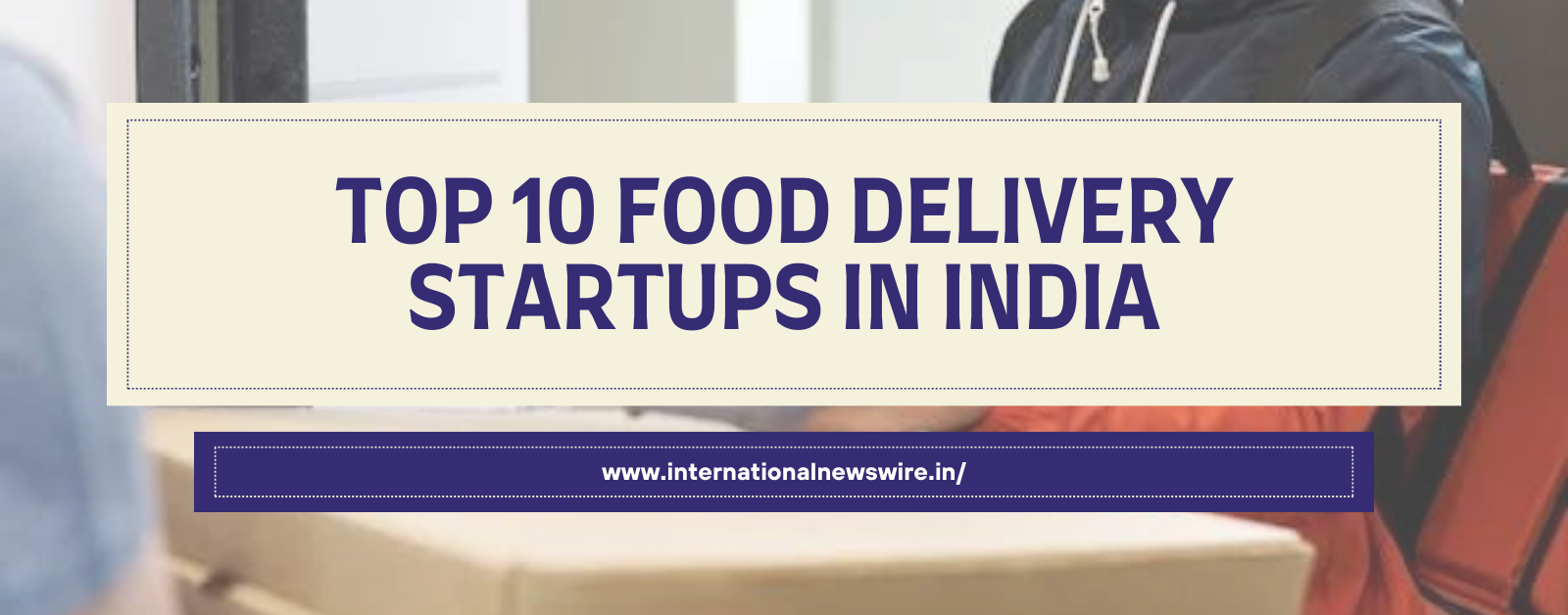In recent years, India’s food delivery sector has experienced a monumental transformation, driven by technological innovation, changing consumer preferences, and the rapid expansion of digital infrastructure. This evolution has paved the way for a dynamic ecosystem of food delivery startups, each revolutionizing how Indians dine, order, and experience food.
At the forefront of this culinary revolution are ten standout companies, reshaping the landscape of food delivery services across the nation. These startups have not only redefined convenience and accessibility but have also elevated the dining experience for millions through their robust platforms and innovative approaches.
Beyond food delivery, these companies have diversified their offerings, venturing into grocery deliveries, cloud kitchens, and subscription-based services to meet the evolving demands of consumers. This expansion has not only bolstered their market presence but also cemented their role as integral players in India’s burgeoning food-tech industry.
With a focus on quality, reliability, and customer satisfaction, these startups continue to innovate, introducing features like real-time tracking, contactless deliveries, and personalized recommendations. They have fostered partnerships with thousands of restaurants and food vendors, creating a seamless ecosystem that benefits both consumers and businesses alike.
Join us as we explore the stories, innovations, and impact of India’s top 10 food delivery startups, each a testament to the entrepreneurial spirit and ingenuity driving the country’s thriving food-tech ecosystem.
Table of Contents
1.Swiggy
Swiggy is one of India’s leading food delivery platforms, launched in 2014 by Sriharsha Majety, Nandan Reddy, and Rahul Jaimini. It revolutionized the food delivery landscape with its on-demand hyperlocal delivery model, providing a seamless experience for customers. Swiggy connects users with a vast network of restaurants and offers features like real-time order tracking, no minimum order value, and attractive discounts. The company has expanded into grocery delivery and other convenience services through Swiggy Instamart and Swiggy Genie, further strengthening its market position.
| Feature | Details |
|---|---|
| Founded | 2014 |
| Founders | Sriharsha Majety, Nandan Reddy, Rahul Jaimini |
| Headquarters | Bangalore, Karnataka |
| Services | Food delivery, grocery delivery, courier delivery |
| App Availability | Android, iOS |
| Major Markets | Across India |
| Funding | Over $2 billion |
| Valuation | Approximately $5 billion |
| Website | www.swiggy.com |
| Key Features | Real-time tracking, no minimum order value, various discounts |
Also Read : Top 10 Gig Economy Startups in India
2.Zomato
Zomato is a global restaurant aggregator and food delivery company founded in 2008 by Deepinder Goyal and Pankaj Chaddah. Initially starting as a restaurant discovery platform, Zomato expanded its services to food delivery, table reservations, and customer reviews. It operates in several countries and has become a household name in India for its extensive restaurant listings and efficient delivery service. Zomato also offers subscription plans like Zomato Pro, providing exclusive deals and discounts to users.
| Feature | Details |
|---|---|
| Founded | 2008 |
| Founders | Deepinder Goyal, Pankaj Chaddah |
| Headquarters | Gurugram, Haryana |
| Services | Food delivery, restaurant discovery, table reservations |
| App Availability | Android, iOS |
| Major Markets | India, UAE, Australia, and more |
| Funding | Over $2.2 billion |
| Valuation | Approximately $5.4 billion |
| Website | www.zomato.com |
| Key Features | Restaurant reviews, Zomato Pro membership, diverse cuisine options |
Also Read : Top 10 Data Privacy Startups in India
3.Dunzo
Dunzo, founded in 2015 by Kabeer Biswas, Dalvir Suri, Ankur Agarwal, and Mukund Jha, is an on-demand delivery service that covers food, groceries, medicines, and more. Initially started as a hyperlocal delivery service in Bangalore, Dunzo has expanded to multiple Indian cities, providing a reliable and quick delivery solution for various needs. It is known for its user-friendly app, wide range of delivery options, and efficient service.
| Feature | Details |
|---|---|
| Founded | 2015 |
| Founders | Kabeer Biswas, Dalvir Suri, Ankur Agarwal, Mukund Jha |
| Headquarters | Bangalore, Karnataka |
| Services | Food delivery, grocery delivery, courier delivery, medicine delivery |
| App Availability | Android, iOS |
| Major Markets | Major Indian cities |
| Funding | Over $140 million |
| Valuation | Approximately $800 million |
| Website | www.dunzo.com |
| Key Features | Quick delivery, diverse service offerings, user-friendly app |
Also Read : Top 10 E-learning Startups in India
4.Ola Foods (formerly Foodpanda India)
Ola Foods, previously known as Foodpanda India, is a part of the ride-hailing giant Ola. It focuses on cloud kitchens and delivering freshly prepared meals from its own brands. Since Ola acquired Foodpanda India in 2017, the company has shifted its strategy towards creating and operating cloud kitchens, providing quality food delivery with a focus on hygiene and taste. Ola Foods aims to cater to various culinary preferences with its diverse menu offerings.
| Feature | Details |
|---|---|
| Founded | 2012 (Foodpanda India), 2017 (Ola acquisition) |
| Founders | Ralf Wenzel, Benjamin Bauer, Felix Plog |
| Headquarters | Bangalore, Karnataka |
| Services | Food delivery, cloud kitchen operations |
| App Availability | Android, iOS |
| Major Markets | Major Indian cities |
| Funding | Part of Ola’s broader funding |
| Valuation | Integrated within Ola’s valuation |
| Website | www.olafoods.com |
| Key Features | Cloud kitchen model, diverse cuisine, focus on hygiene |
Also Read : Top 10 Coding Bootcamps in India
5.Uber Eats India (acquired by Zomato)
Uber Eats entered the Indian market in 2017, offering food delivery services through its extensive network. Known for its efficient logistics and wide range of restaurant partners, Uber Eats quickly gained popularity. However, in 2020, Uber Eats India was acquired by Zomato, and its operations were merged with Zomato’s platform. This acquisition strengthened Zomato’s market presence and expanded its customer base.
| Feature | Details |
|---|---|
| Founded | 2017 |
| Founders | Uber (parent company) |
| Headquarters | Mumbai, Maharashtra |
| Services | Food delivery (now merged with Zomato) |
| App Availability | Android, iOS |
| Major Markets | Major Indian cities |
| Funding | Part of Uber’s broader funding |
| Valuation | Integrated within Zomato’s valuation |
| Website | www.zomato.com |
| Key Features | Efficient logistics, wide restaurant network (prior to merger) |
Also Read : Top 10 Financial Inclusion Startups in India
6.Box8
Box8, founded in 2012 by Amit Raj and Anshul Gupta, is a full-stack food delivery company that focuses on providing Indian meals with a modern twist. The company operates its own kitchens, ensuring control over food quality and delivery standards. Box8 offers a variety of meal options, including wraps, sandwiches, and biryanis, catering to diverse tastes. Its emphasis on using fresh ingredients and maintaining hygiene has made it a popular choice among customers.
| Feature | Details |
|---|---|
| Founded | 2012 |
| Founders | Amit Raj, Anshul Gupta |
| Headquarters | Mumbai, Maharashtra |
| Services | Food delivery, own kitchen operations |
| App Availability | Android, iOS |
| Major Markets | Major Indian cities |
| Funding | Over $35 million |
| Valuation | Approximately $100 million |
| Website | www.box8.in |
| Key Features | Full-stack operations, fresh ingredients, diverse meal options |
Also Read : Top 10 Microfinance Startups in India
7.Faasos
Faasos, founded in 2011 by Jaydeep Barman and Kallol Banerjee, is a leading food delivery service specializing in wraps, rolls, and meals. Operating through a cloud kitchen model, Faasos ensures quick and efficient delivery by preparing food in strategically located kitchens. The company has diversified its menu to include various cuisines and offers an app for convenient ordering. Faasos is part of the Rebel Foods network, which houses multiple brands under one roof.
| Feature | Details |
|---|---|
| Founded | 2011 |
| Founders | Jaydeep Barman, Kallol Banerjee |
| Headquarters | Pune, Maharashtra |
| Services | Food delivery, cloud kitchen operations |
| App Availability | Android, iOS |
| Major Markets | Major Indian cities |
| Funding | Over $500 million (Rebel Foods) |
| Valuation | Approximately $1.4 billion (Rebel Foods) |
| Website | www.faasos.com |
| Key Features | Cloud kitchen model, diverse cuisine, efficient delivery |
Also Read : Top 10 Social Impact Startups in India
8.FreshMenu
FreshMenu, founded in 2014 by Rashmi Daga, is a food delivery service that offers a rotating menu of freshly prepared meals. The company operates through cloud kitchens, ensuring high-quality standards and quick delivery times. FreshMenu focuses on gourmet-style dishes and a variety of international cuisines, catering to the tastes of urban professionals. The company’s app and website provide a seamless ordering experience with detailed descriptions and images of each dish.
| Feature | Details |
|---|---|
| Founded | 2014 |
| Founders | Rashmi Daga |
| Headquarters | Bangalore, Karnataka |
| Services | Food delivery, cloud kitchen operations |
| App Availability | Android, iOS |
| Major Markets | Major Indian cities |
| Funding | Over $25 million |
| Valuation | Approximately $75 million |
| Website | www.freshmenu.com |
| Key Features | Gourmet-style dishes, rotating menu, cloud kitchen model |
Also Read : Top 10 Sustainable Startups in India
9.Behrouz Biryani
Behrouz Biryani, part of the Rebel Foods network, specializes in delivering premium biryani across various Indian cities. Founded in 2015, Behrouz Biryani has gained popularity for its rich flavors and high-quality ingredients. The brand operates through a cloud kitchen model, ensuring efficient delivery and consistent food quality. Behrouz Biryani offers a variety of biryani options, catering to both vegetarian and non-vegetarian preferences, and emphasizes a royal dining experience.
| Feature | Details |
|---|---|
| Founded | 2015 |
| Founders | Rebel Foods (parent company) |
| Headquarters | Pune, Maharashtra |
| Services | Food delivery, cloud kitchen operations |
| App Availability | Android, iOS |
| Major Markets | Major Indian cities |
| Funding | Part of Rebel Foods’ funding |
| Valuation | Integrated within Rebel Foods’ valuation |
| Website | www.behrouzbiryani.com |
| Key Features | Premium biryani, cloud kitchen model, high-quality ingredients |
Also Read : Top 10 Circular Economy Startups in India
10.Biryani By Kilo
Biryani By Kilo, founded in 2015 by Kaushik Roy and Vishal Jindal, is a food delivery startup specializing in traditional dum biryani. The company prepares biryani in individual handis (earthen pots) and delivers them to customers, ensuring authentic taste and freshness. Biryani By Kilo focuses on using high-quality ingredients and maintaining hygiene standards. It has expanded rapidly, serving a variety of biryani and kebab options across multiple cities in India.
| Feature | Details |
|---|---|
| Founded | 2015 |
| Founders | Kaushik Roy, Vishal Jindal |
| Headquarters | Gurugram, Haryana |
| Services | Food delivery, biryani preparation in handis |
| App Availability | Android, iOS |
| Major Markets | Major Indian cities |
| Funding | Over $20 million |
| Valuation | Approximately $50 million |
| Website | www.biryanibykilo.com |
| Key Features | Traditional dum biryani, high-quality ingredients, individual handis |
Also Read : Top 10 Language Learning Startups in India
FAQs on Food delivery startups in India
1. What are food delivery startups?
Food delivery startups are companies that provide on-demand delivery services for food from restaurants, cloud kitchens, or other food vendors to consumers’ doorsteps. They typically operate through mobile apps or websites, allowing users to browse menus, place orders, and track deliveries in real-time.
2. What are the benefits of using food delivery services?
Using food delivery services offers several benefits, including:
- Convenience: Order food from the comfort of your home or office.
- Variety: Access to a wide range of cuisines and dishes from multiple restaurants.
- Time-saving: Skip cooking and cleaning, especially during busy days.
- Special offers: Discounts, promotions, and loyalty programs available through apps.
3. How do food delivery startups work?
Food delivery startups typically follow these steps:
- Customers browse menus and place orders through the startup’s app or website.
- Restaurants or cloud kitchens receive orders and prepare the food.
- Delivery partners (drivers or couriers) pick up the orders and deliver them to customers’ locations.
- Customers can track their orders in real-time and receive them at their doorstep.
4. What are some popular food delivery startups in India?
Popular food delivery startups in India include Swiggy, Zomato, Dunzo, Ola Foods (formerly Foodpanda India), Uber Eats (now merged with Zomato), Box8, Faasos, FreshMenu, Behrouz Biryani, and Biryani By Kilo.
5. How do food delivery startups ensure food safety and quality?
Food delivery startups ensure food safety and quality through various measures:
- Partnering with reputed restaurants and cloud kitchens that maintain hygiene standards.
- Regular inspections and audits of partner establishments.
- Temperature-controlled delivery bags to preserve food freshness.
- Customer feedback and ratings system to maintain service quality.
6. What additional services do food delivery startups offer?
In addition to food delivery, many startups offer:
- Grocery delivery: Delivering groceries and essentials to customers’ homes.
- Cloud kitchens: Operating their own kitchens to prepare and deliver food under their brands.
- Subscription services: Membership programs offering discounts and benefits for regular customers.
- Special promotions: Seasonal offers, deals, and collaborations with restaurants.
7. How do food delivery startups handle customer support and issues?
Food delivery startups typically provide customer support through:
- In-app chat support or helpline numbers for order tracking and assistance.
- Refund and cancellation policies for order-related issues.
- Feedback mechanisms to address customer complaints and improve service quality.
8. Are food delivery startups environmentally friendly?
Many food delivery startups are adopting eco-friendly practices, such as:
- Biodegradable packaging materials to reduce plastic waste.
- Optimal route planning for delivery partners to minimize carbon emissions.
- Collaborations with sustainable food suppliers and local producers.
9. How have food delivery startups impacted the restaurant industry in India?
Food delivery startups have revolutionized the restaurant industry by:
- Increasing visibility and reach for restaurants, especially smaller establishments.
- Generating additional revenue streams through delivery services.
- Facilitating digital marketing and customer engagement through app-based promotions.
- Encouraging innovation in menu offerings and culinary trends to meet consumer demands.
10. What is the future outlook for food delivery startups in India?
The future of food delivery startups in India looks promising, with continued growth driven by:
- Technological advancements in AI, machine learning, and logistics.
- Expansion into tier II and III cities to tap into new markets.
- Diversification into new categories like health-conscious meals and ethnic cuisines.
- Enhanced focus on sustainability, customer experience, and operational efficiency.
Conclusion
In conclusion, the rise of food delivery startups in India represents more than just a convenience; it mirrors a profound shift in how society perceives and interacts with food. These startups have not only transformed the way we dine but have also catalyzed significant changes in urban lifestyles, consumer behaviors, and the restaurant industry at large.
By leveraging technology to streamline ordering processes, ensure timely deliveries, and offer diverse culinary experiences, these startups have embedded themselves deeply into the fabric of everyday life. They have democratized access to a wide array of cuisines, allowing consumers to explore flavors from around the world without leaving their homes.
Moreover, these platforms have become engines of economic growth, creating employment opportunities for thousands of delivery partners and kitchen staff across cities. They have fostered entrepreneurship by enabling restaurants, from established chains to home kitchens, to reach a broader audience and thrive in a competitive market.
Looking ahead, food delivery startups in India are poised to continue their trajectory of innovation and expansion. With a focus on sustainability, quality, and customer-centricity, they are likely to introduce new services, forge strategic partnerships, and embrace emerging technologies to enhance operational efficiency and meet evolving consumer demands.
As these startups navigate challenges and seize opportunities in a rapidly evolving digital landscape, their impact on the food industry will extend far beyond convenience, shaping the future of dining experiences and urban living in India and beyond.
Also Read :
- Top 10 Gig Economy Startups in India
- Top 10 Data Privacy Startups in India
- Top 10 E-learning Startups in India
- Top 10 Language Learning Startups in India
- Top 10 Coding Bootcamps in India
- Top 10 Financial Inclusion Startups in India
- Top 10 Microfinance Startups in India
- Top 10 Social Impact Startups in India
- Top 10 Sustainable Startups in India
- Top 10 Circular Economy Startups in India
Last Updated on Saturday, June 22, 2024 9:18 am by International Newswire Team



